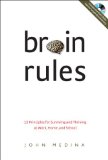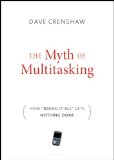Feb 24, 2009
Clearly we are a culture of jugglers.
Whether working with my executive coaching clients or talking with
participants in our keynotes and workshops, without a doubt most
people are feeling overwhelmed with too much to do and not enough
time to do it.
So we multitask. Or so we think.
 One of my favorite books from last
year is Brain Rules: 12 Principles for Surviving and
Thriving at Work, Home, and School, by John Medina. I'm a card
carrying geek in a number of categories, one of which is learning
about how the brain works.
One of my favorite books from last
year is Brain Rules: 12 Principles for Surviving and
Thriving at Work, Home, and School, by John Medina. I'm a card
carrying geek in a number of categories, one of which is learning
about how the brain works.
Just think how much better we could learn, communicate, influence,
and more if we really understood how the brain operated. That's
what Brain Rules is all about.
One of my favorite lines from the book says, "If you wanted to
create a business environment that was directly opposed to what the
brain was good at doing, you probably would design something like a
cubicle!" Though you can find plenty of pundits that will
pontificate about the collaborative benefits of cubes, I've yet to
find a brain expert that backs that up!
As the subtitle of the book states, Brain Rules
has 12 principles to help people better understand how the brain
works. The 4th rule is Attention: We don't pay attention to
boring things. Dr. Medina discusses how we are better at
seeing patterns and abstracting the meaning of an event than we are
at recording details. He also illustrates how emotional arousal
helps the brain learn--emotions help keep our attention and burn
the memory in.
But Dr. Medina's discussion on multitasking is what really caught
my attention. Bottom line: the brain's attentional
spotlight can focus on only on thing at a time. There is no such
thing as multitasking.
You and I might argue, "How can this be? I'm multitasking all the
time!" Dr. Medina goes into all the brain scientist geek material
to back up his assertion. And here's why it all matters. Studies
show that a person who is interrupted takes 50 percent longer to
accomplish a task. Not only that, he or she makes up to 50 percent
more errors.
I say this fully aware that you might be listening to this cast
while you're driving. Be careful as it's not just cell phone calls
that distract you while driving!
Whether in the car or in the workplace, distractions are taking
their toll. As someone who is passionately interested in helping
people get more done with less stress, this whole topic strikes a
nerve with me.
 Which leads me to another recommended
brain book entitled The Myth of Multitasking, written by Dave
Crenshaw.
Which leads me to another recommended
brain book entitled The Myth of Multitasking, written by Dave
Crenshaw.
Dave is our guest on this cast and shares insights on why
multitasking actually hurts our productivity. During the interview
Dave encourages you to take a free
multitasking test on his website at:
http://www.davecrenshaw.com/andykaufman
Don't miss the free offer at the end of the cast! Here's to a very
focused day for you! Thank you for subscribing to the People and
Projects Podcast!




